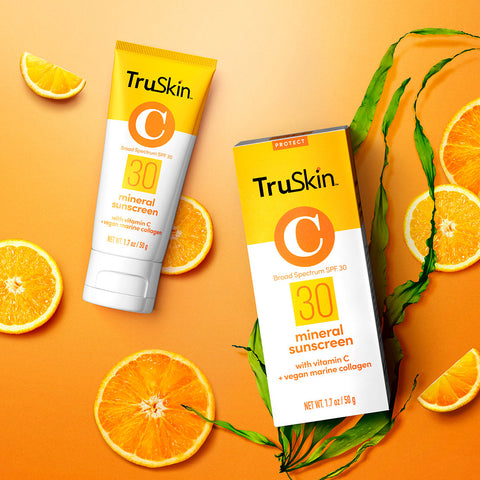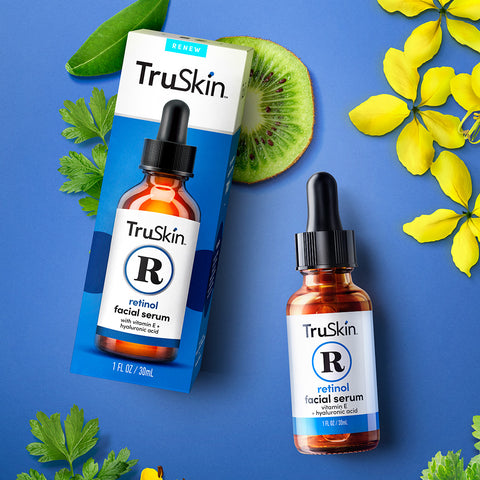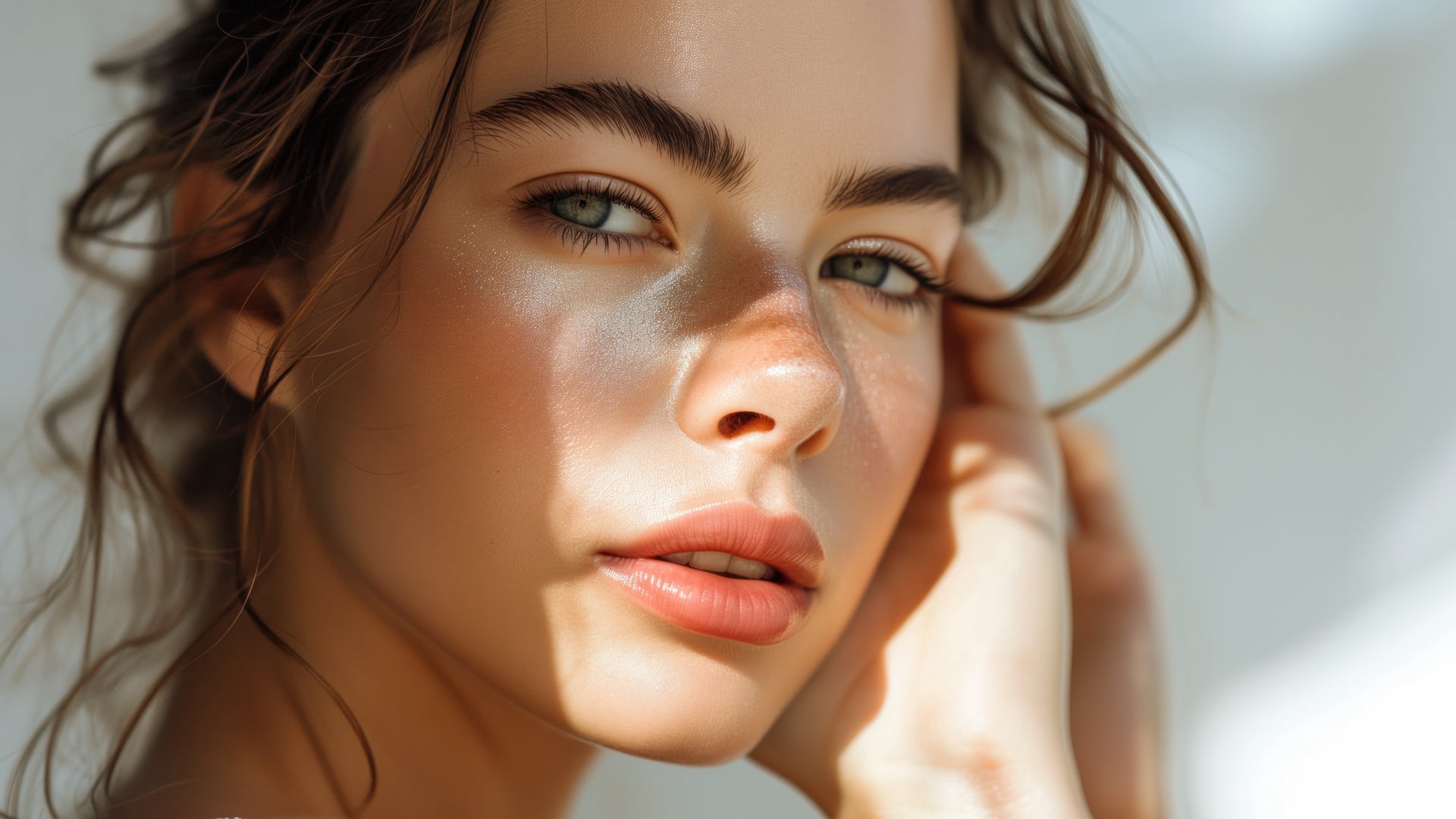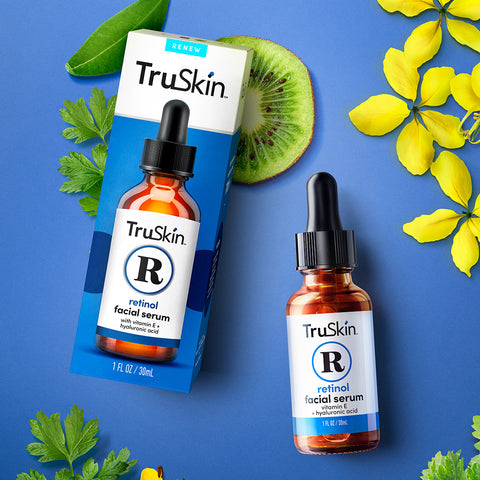
True Radical Honesty From Our Community
What To Do If You Hate Those Fine Lines Around Your Lips
Read MoreAdvice for all of your skin care needs
-
Because it's almost time to wave winter goodbye and welcome the season of sunshine and glowy skin.
Good news, people: you and your skin have made it through winter and spring is officially in the air.
So what should you do to ensure you’re doing the best for your skin as the weather changes and the temperatures rise? Well, we believe that a great skincare routine should, first and foremost, be as consistent as possible. Do you have a darling cleanser you could not live without? Then stick with it. Love your night cream more than life itself? Then you keep doing you. However, as the year passes and the weather transitions from winter to spring, there might be certain products in your routine that, while might have worked great in the colder months, suddenly feel a bit much.
Crazy rich moisturizers and heavy treatment masks, for example, are all great when dry, cold temps outdoors combine with dry, warm air indoors, sucking all the life and moisture from your skin. But do you really need them once humidity increases and the mercury rises? Probably not.
Instead, here are five important ways to get your skin (and your skincare routine) ready for spring…
1. Exfoliate More Regularly
Exfoliation often takes a bit of a back seat in the winter when the thought of exacerbating dryness and upsetting your skin’s barrier function far outweighs the potential benefits of exfoliation. And we get that. Dry, cold weather dehydrates your skin and can even cause irritation, so why on earth would you want to mess with that by overusing facial scrubs or exfoliating acids?
In the spring, however, humidity levels increase which offers up more natural moisture for your skin to soak up and hydrate itself with. This means skin becomes more resilient and is able to tolerate regular, albeit gentle exfoliation to boost cell turnover and freshen it up for sunnier days ahead. Also, if your skin is anything like ours, by the end of winter it definitely could do with a little radiance boost.
We recommend our 6% AHA, BHA + PHA Liquid Exfoliant which is non-abrasive and a gentle way to exfoliate your skin. But don't get us wrong, it still packs a good enough punch to boost sluggish skin turnover and wake up your collagen supplies. Depending on your skin type, you can use this exfoliating lotion every day but always patch test first, and if you have super sensitive skin, try it just two or three times a week.
2. Lighten Up Your Moisturizing Regime
There’s no better feeling than smothering your face and neck with a rich moisturizer in the winter months. But as the weather gets better and your skin starts to hydrate itself more efficiently (and maybe sweat a little more)? Not so much.
Spring and summertime are when lighter moisturizers come into their own. Unless you have very dry skin all year round, now’s the time to move away from heavy, occlusive ingredients like cocoa butter and mineral oils in favor of lighter, hydrating humectants and emollients. Humectants, which include the likes of glycerin and hyaluronic acid, draw water into the skin’s top layers while emollients like jojoba oil and squalane help to lock moisture into your skin without clogging up your pores.
Feel like lightening up for spring? Our favorite moisturizer for this time of year is our Vitamin C Brightening Moisturizer which also contains an added glow-getting boost of vitamin C. Speaking of which…
3. Embrace The Benefits Of Vitamin C
It’s wise to go easy on potent, active ingredients like retinol, vitamin C and glycolic acid in the winter when your skin is drier, more dehydrated and easily irritated by strong ingredients. However, as humidity levels rise your skin becomes way more tolerant to powerful ingredients.
That’s why we believe spring is the best time to introduce some topical actives into your routine. And what better than vitamin C?
Vitamin C is a freakin’ amazing antioxidant, making it the perfect choice when you’re spending more time in the great outdoors. Because, sun damage. What’s more, it also helps your skin tone remain even and bright by keeping melanin production under control.
We have a whole bunch of winning vitamin C formulas but for the most powerful boost try our Vitamin C Super Serum + two or three nights a week under moisturizer. You could even alternate it with our classic Vitamin C Facial Serum if that floats your boat. We don’t think you’ll regret it.
4. Breathe Life Back Into Your Pores
All those heavy moisturizers and weighty makeup choices can sure weigh down your pores, so now’s a great time to give your skin a detox. Or a spring clean, if you will.
Cleansing in the winter can be a real juggling game because skin becomes very needy in the moisture department during those cold, dry months. However, come spring you can afford to introduce deeper cleansing ingredients into your routine – if that’s what your skin needs, of course.
Don’t fall into the trap of over-cleansing your skin with a routine that’s packed with chemicals, however. This will dry out your skin and fool your sebaceous glands into thinking your skin needs more oil. And the more oil your skin produces, the more likely it is to bind itself to bacteria, dirt and makeup, stretching your pores and asking for trouble, aka breakouts.
Instead, choose gentle, effective cleansing products that harness balancing ingredients like tea tree oil, coconut charcoal and kaolin. Wash your face in lukewarm, never hot water, and use a light massaging technique to thoroughly cleanse your skin without over-stimulating your pores. Try our Tea Tree Super Cleanser + to help kick-start dreary, end-of-winter skin.
5. Be Extra Vigilant With SPF
Of course, you’ve been routinely applying your SPF all winter long, right? RIGHT? Well, if you haven’t, then a) shame and you and b) best you rectify that right now.
While UVA rays are able to penetrate through clouds and are present all year long – rain or shine – the intensity of UVB rays increases in the warmer months when the earth is closer to the sun. Of course, they’re at their peak during summer, but if ever there was a time to start being more strict with your SPF, spring is it. Start now and it’ll become a habit before you even know it.
We recommend applying SPF 30 Mineral Sunscreen with Vitamin C every morning as an absolute must. Even if you hate the feeling of sunscreen on your skin, this sheer, lightweight formulation is sure to win you over.
Spring Skin Prep – Yes, It's That Time Again!
read more -
Fine lines and wrinkles are totally natural, but if you want to lessen their impact, you might want to take a look at some of these seemingly innocent lifestyle habits.
We’ve lost count of the number of times we’ve warned you about the perils of the sun and its effect on the number and intensity of your wrinkles. Ditto for stress, smoking and a lack of sleep. But while these things are up there as the most common culprits of aging skin – the sun being the number one offender, of course – there are plenty of other everyday lifestyle habits you probably didn’t realize were affecting the rate at which your skin aged.
Obsessed with your Stanley water bottle right now? Well, for one thing, who isn’t? But for another, you might want to rethink that whole drinking-from-a-straw situation once you’ve read the rest of this article. You have been warned…
Drinking From A Straw
One of the main reasons smoking is so bad for your skin (toxic chemicals aside) is the repetitive motion of puckering up your lips. How so? Well, this repeated action contracts a ring of muscle around the mouth area called the orbicularis oris muscle. Over time, this causes your skin to lose elasticity. And you know those lines you see when you purse your lips? Instead of going away after you relax your mouth, they start to become permanently etched in.
Same thing happens if you drink through a straw all day long.
What To Do: As much as we know you love your Stanley Quencher try not to drink out of it 24/7. At home, switch it out for a regular glass and when you’re out and about go for a water bottle that doesn’t have a straw. Oh, and if you get offered a straw when you next order a gin and tonic in a bar, say no. Those fine lines around your lips – as well as the environment – will be forever grateful.
Your Smartphone
What would we do without our digital devices? They are pretty much everything in today’s modern world. And we wouldn’t have it any other way. However, your smartphone, in particular, plays a huge part in the health of your skin. For one thing, constantly looking down while texting, gaming, emailing and browsing can accelerate the formation of creases or bands around the circumference of your neck, aka ‘tech neck.’ Similarly, squinting and frowning at your phone can add even more lines and wrinkles both on your forehead and around your eyes.
Your digital devices also emit something called high-energy visible (HEV) or blue light which studies suggest are just as damaging to your skin as UV light. Blue light not only has the potential to disrupt your skin’s natural barrier function but it can promote inflammation, encourage discoloration and accelerate collagen damage which is a one-way ticket to fine lines and wrinkles.
What To Do: Use your phone less (ha, if only it were that easy!) and always hold it upright so your head isn’t looking down all the time.
You must also try our awesome Longevity skincare range. This collection of three healthy aging products contains lingonberry stems cells which have been shown to help protect your skin from blue light damage.
The Way You Sleep
Getting lots of quality sleep is majorly important for the state of your skin, but skincare experts also agree that the way in which you sleep carries just as much weight on your skin’s aging process. Sleeping on one side, for example, causes creasing on that same side of your face which can increase your chances of developing fine lines on one side more than the other. Similarly, sleeping on your front and smushing your face into your pillow every night creates repeated pressure on your entire face – a sure-fire way to invite fine lines and wrinkles to do their worst.
What To Do: A silk pillowcase can help reduce friction, but your best bet is to change your sleep position so you sleep on your back with your head slightly raised. This avoids repetitive face-to-pillow contact and stops excess fluids from pooling under your eyes which helps stop dark circles and puffiness. Extra bonus right there.
Forgetting To Wear Sunglasses
Squinting is another one-way ticket to fine lines and wrinkles around the eyes as it causes your periocular muscles to repeatedly contract. And if you continue to do this day after day you will soon see exactly what we mean when those cute lines around your eyes turn into deep crevices that just won’t go away. Squinting also contributes to those annoying vertical lines between your eyebrows – glabellar lines or 11s – making it a real no-no if you care about aging skin.
What To Do: Wear shades whenever you go outside – even if it’s bright but not particularly sunny. This’ll immediately stop you squinting and will also protect the skin around your eyes from those damaging UV rays. And if you find yourself squinting at your computer or the TV? Well, it might be time for an eye test. Just saying.
Finally, to help keep the skin around your eyes moisturized and youthful-looking, apply an eye cream morning and night. Try our Peptide Eye Gel which helps support collagen production to minimize premature aging.
Allergies
Do you find yourself continually rubbing the skin around your eyes during the allergy season? This happens when your body’s defense system reacts to an allergen it feels threatened by. Mast cells in your eyes then release chemicals like histamine to try and get rid of these allergens which causes your eyes to become red, watery and itchy.
Allergy triggers can come from many things, including airborne pollen and pet hair, but the worst thing you can do for your skin is to vigorously scrub away at your eyes. This seriously upsets your collagen supplies, thinning your skin, wearing it down and inviting lines around your eyes to do their worst.
What To Do: If your eyes are constantly itching, the most important plan of action is to find out why, so talk to your doctor if symptoms persist. In the meantime, try eye drops and if you can't help but rub your eyes, reduce damage by using just the pads of your ring fingers rather than your whole hand. This will help reduce pressure and friction.
Swimming
We hate to knock any form of exercise but swimming in chlorinated water can be pretty harsh on your skin (and your hair for that matter!). Chlorine is great for sanitizing water and eliminating any contaminants that may otherwise cause infection and illness. But it’s not ideal for your delicate skin. In fact it’s a natural irritant that strips natural oils and moisture from your skin’s protective barrier. This is OK in small doses but if you swim every day and don’t protect your skin, this can potentially cause dryness and dehydration. And two things wrinkles love in order to thrive are dryness and dehydration.
What To Do: A pre-swim shower is a great way to reduce chlorine damage because if your skin is already wet, it will absorb less chlorinated water. Smart huh? Of course, you should also shower immediately after swimming and moisturize all over to replace lost sebum and hydration.
When it comes to your face, apply Vitamin C Facial Serum to fully cleansed skin after swimming. Vitamin C helps neutralize the damaging effects of chlorine. Follow with moisturizer and you should be good.
3 Of Our Favorite Wrinkle-Busting Skincare Products
Because a little help goes a very long way...1. Collagen Boosting Skin Supplement
Want to keep your skin looking its best for as long as possible? Then you simply have to look after your collagen. And what better way than with this daily supplement that’s literally brimming with clinically-proven, collagen-promoting ingredients like vitamin C, acai and biotin.
2. SPF 30 Mineral Sunscreen with Vitamin C
Did we mention that the sun is the biggest culprit when it comes to premature skin aging? We did? Yeah, well, we will continue to do so. We will also continue to laud the benefits of daily, broad-spectrum sunscreen for warding off the sun’s damaging UV rays. And this is an absolute must. No arguments.
One of the most effective anti-aging ingredients in skincare, retinol helps stimulate cell turnover and up your skin’s content of quality collagen. This awesome facial serum also contains hydrating hyaluronic acid (take that wrinkles) and vitamin E (same). We love that for you.
Weird Things That Can (Surprisingly!) Give You Wrinkles
read more -
The truth is, glowing skin will always be in.
Oh, the heady heights of glowing, healthy skin. Whether you prefer to use the term ‘bright,’ ‘glowy,’ ‘dewy’ or ‘radiant’: we can’t think of a single person who wouldn’t want their skin to be described by one (or all!) of these words. Why is it such an elusive and lusted-after skin condition? Because no matter your skin type or how many wrinkles you do or don’t have, nail that radiant glow and everything else pales into insignificance.
But, how to get glowing skin? Now there’s a question that has as many answers as we’ve had hot dinners.
You can start with what goes in your body, of course, taking a look at your diet and ensuring you chow down on plenty of antioxidant-rich fruit and veggies and cut back on things like booze, sugar, salt and processed carbs. This helps nix skin-damaging free radicals to ensure your skin turns over efficiently and remains healthy from the inside out, making it a great place to start.
There are also things like exercising outdoors to get your blood flowing, massaging your skin as you cleanse, getting plenty of shut-eye and faking it with highlighting makeup and shimmering face powders.
But skincare is our thing, so today we’re going to focus on that.
There are many awesome ingredients and products out there that claim to rejuvenate your skin and freshen up your complexion, but what are the true tried and tested contenders? Keep scrolling for, what we believe, are five of the best products for glowing skin.
1. The Definitive Glow-Giving Facial Serum
Let’s get one thing straight, there’s no better skincare ingredient for boosting a radiant glow than vitamin C. Vitamin C (otherwise known as l-ascorbic acid) has been researched to death over the years and it’s been proven to offer all manner of skin-boosting benefits – glowier skin being just one of them.
So how does this powerhouse work? Well, further to its antioxidant powers, which in themselves are great for strengthening your collagen supplies and improving cell turnover, it also helps slow down melanin production. Melanin, as you know, is what gives your skin its individual color and, when you expose your skin to UV radiation, it’s also what makes you tan. However, melanin production isn’t always smooth sailing. In fact, many triggers such as unbalanced hormones and too much sun can make your melanin go all over the place, resulting in patchy skin, dark spots and hyperpigmentation. No fun. No fun at all.
We believe vitamin C should be a staple in anyone’s skincare regime, but we also understand that it’s a potent ingredient that can cause sensitivities in certain skin types. This is why we infuse all of our vitamin C products with a milder version called sodium ascorbyl phosphate.
When it comes to looking for your perfect match for brightening your skin, you could literally take your pick of our entire vitamin C range, but for a classic favorite, you can’t go wrong with Vitamin C Facial Serum. We believe it’s a winner. Over 140,000 people on Amazon agree with us. We rest our case.
2. The Moisturizer With The Most
If you’re yet to try our new Renewing Longevity Moisturizing Cream you are missing out. It doesn’t contain vitamin C – because choices – but it is powered up by another ingredient that’s already making headlines for all the right reasons: bakuchiol.
Bakuchiol is nature’s alternative to the mighty retinol. Extracted from the seeds and leaves of the babchi plant, it’s fast becoming hot property in the skincare world due to its extraordinary skin benefits (just like retinol) and lack of irritating side-effects (unlike retinol!). We mean no offense to retinol, of course, because it’s still one of, if not THE gold standard of skincare. However, it’s not for everyone and bakuchiol has undergone plenty of studies that show it’s right up there, stimulating collagen synthesis and accelerating cellular turnover in a very similar way to rid your skin of unwanted dead skin cells and help improve your radiance factor.
We have a whole collection of products that harness the powers of bakuchiol but for a great introduction to the range, try this deliciously smooth moisturizer that’s ideal for all skin persuasions, including sensitive skin.
3. The One That’s In It For The Long Game
Admittedly this one might not make your skin look immediately radiant but c’mon now, patience is everything. And in all honesty, this is unarguably the single most important product you could use for glowing skin, healthy skin, smooth skin, strong skin, the works.
So what is this too-good-to-be-true product we speak so highly off? Simple. Sunscreen. Now don’t roll your eyes at us in a ‘not that old chestnut’ fashion because we don’t bang on about sunscreen just to pee you off. We do it because we care about your skin.
The simple truth is that if you don’t protect your skin from the sun’s damaging UV rays, your collagen supplies will dwindle, elastin will get destroyed, dark spots will appear and cell turnover will decrease. This all leads to dull, lackluster, sad-looking skin. And that’s just touching the surface.
Ensure you apply a quality, broad-spectrum sunscreen every morning without fail to make sure your skin doesn’t get caught up in all that damaging nonsense.
Try our SPF 30 Mineral Sunscreen which also comes packed with sodium ascorbyl phosphate (that supercool vitamin C derivative we spoke of earlier) on top of hydrating ingredients like squalane and cucumber, plus vegan marine collagen to help target fine lines and sagging skin.
4. The All-Important Skin Exfoliator
If your pores are filled to the brim with sebum, sunscreen, makeup and dead skin cells, your skin stands no chance of being smooth and radiant. Dead skin cells, in particular, create the perfect storm for dull skin.
One of the simplest ways to keep your skin clear from complexion-killing pore plugs is to use a chemical exfoliator like 6% AHA, BHA + PHA Liquid Exfoliant two or three times a week. Chemical exfoliation works by using certain ingredients –commonly fruit acids – to break down the glue that holds dead skin cells together. By doing so, they’re an incredible way of forcing these unwanted cells to sling their hook so that the fresher, brighter ones can make their way to the surface. And unlike physical exfoliation which uses pressure and movement (like scrubs and cleansing brushes), chemical exfoliation, when done correctly, is far less damaging and irritating.
Our fabulous 6% AHA, BHA + PHA Liquid Exfoliant combines a carefully crafted blend of three exfoliating acids along with organic reishi mushroom and hyaluronic acid to combat dehydration and help soothe and nourish the skin. Because, btw, dehydration will also kill your glowy skin vibes.
5. The Dewy Skin Spritz
Convenient and effective, our Ocean Minerals Super Toner is often glossed over in our line-up of skincare greats, but it’s a real goodie in the quest for a revamped complexion. Not only is it formulated with two key skin-brightening players – vitamin C and glycolic acid – but it also contains power-packed peptides, collagen-boosting MSM and over 90 revitalizing marine minerals. All this adds up to some serious love which helps to remove dull, dead skin cells, detox your pores and smooth the surface for a more balanced, even skin tone.
It's an awesome addition to your skincare routine and takes just seconds of your time to apply. So, why not?
Why not indeed.
The Products We Swear By For Bright, Dewy Skin
read more -
Want to better the texture of your skin and help transform the rough into the smooth? Done.
Skin concerns can vary greatly. Whether it’s hormonal breakouts that just won’t let up, puffy morning eyes after too much of a good time, or pesky dark spots that crop up on your cheeks every year – no matter how prudent you are with the sunscreen – there’s always something.
Take rough, uneven skin, for example. Poor texture might not be life threatening or even that noticeable to the untrained eye. But we get it, touching your skin and feeling bumps, flakes and rough patches instead of baby-smooth skin is as frustrating as hell.
So, why is uneven skin texture such a royal pain in the butt? Well, bumpy skin can be super persistent for starters. It's also impossible to cover up with makeup. In fact, makeup often makes it look ten times worse. And then there are the gazillion reasons why it’s there in the first place. OK, maybe there aren’t that many, but you get the picture.
If you’re fed up with bumpy skin simply not letting up, read on for some important intel that might just help you say ciao to the rough stuff…
First Up, What’s Causing Your Uneven Skin Texture?
Oh, if only we had a straight answer to this question. But alas, when it comes to the health of your skin, things are never quite that black and white.
Poor skin texture can be caused by any number of things which is pretty unhelpful, we know. Thankfully they can, at the very least, be put into four main camps: chronic skin disorders; sluggish cell turnover; an overly complicated skincare routine and surprise, surprise, the sun.
First up we have skin disorders like rosacea, eczema, psoriasis and acne. All of these can make your skin feel bumpy and rough to the touch – especially during flare-ups. And if you’re not careful, scarring from severe acne can also leave you with textural issues in the long-term. So, if you think you might be dealing with some kind of chronic skin complaint like the aforementioned, the only real way to get a handle on what’s going on is to get a professional diagnosis from a dermatologist. Trying to solve these on your own (particularly when you don’t know what you’re dealing with) can be a long, hard struggle and even then you might never achieve the best results.
Other textural issues are most commonly caused by sluggish cell turnover which allows dead skin cells to persistently stick around at the surface of your skin. This results in dullness, dehydration and rough, clogged pores. And then there’s an overly complicated skincare routine that’s packed to the brim with active ingredients. Active ingredients are great in moderation, but too much of a good thing can totally over-stimulate your skin, leaving it feeling bumpy and irritated.
Finally, the sun. This is the one thing you can blame for almost all of your skin woes. And it’s valid. UV radiation disrupts your collagen supplies and causes your cells to prematurely break down and die, leaving you with seriously uneven skin texture (and tone, for that matter!).
How To Boss Smoother Skin
As mentioned, for slightly complicated issues like rosacea and eczema, get thee to a derm. However, if you think your textural issues are more a case of poor cellular turnover, cruddy skincare and/or too much time in the sun, here are five fantastic ways to help smooth things over…
1. Exfoliate On The Reg
The best way to accelerate cell turnover and reduce build-up on the surface of your skin is to exfoliate more often. Don’t get us wrong, most people don’t need to exfoliate daily – that can exacerbate the problem – but two or three times a week with a physical scrub, or three to four times a week with a chemical exfoliant can do wonders for bumpy skin.
Our awesome NEW 6% AHA, BHA + PHA Liquid Exfoliant is a great choice for textural issues because it’s formulated with a sweet blend of glycolic acid, salicylic acid and glucolactone which provide the ideal amount of deep exfoliation and oil control, without upsetting the balance of your skin.
2. Don’t Skip Your SPF
UV radiation is a devil on the skin, screwing up your pores and totally messing with collagen production. Both of which are bad news if you want to get anywhere near the heady heights of smooth skin.
Protect your skin every day with a mineral sunscreen that has a minimum of SPF 30 and is also broad-spectrum. The latter is super important because it means it protects your skin not only from UVB radiation (which is what the SPF denotes) but UVA radiation as well. And that’s the stuff that gets right through those clouds on cold, wintry days, damaging your skin, rain or shine. Try our fabulous SPF 30 Mineral Sunscreen with Vitamin C as the last step in your morning routine.
3. Make Retinol A Bedtime Favorite
Of course, one of the best ingredients for uneven skin texture is retinol. As per! Although totally different to exfoliants, retinol also has a clever way of boosting turnover and accelerating collagen production to help improve texture, tone, acne, the works. Retinol is not always advisable for rosacea or eczema-prone skin because it’s a potent little beast, but as long as you introduce it slowly and carefully into your routine, it can have skin-transforming results for most skin types.
Give our Retinol Facial Serum a go in the evenings, two or three times a week, after cleansing and before moisturizing.
4. Dose Up On Vitamin C
When it comes to waging war on skin-roughening free radicals, vitamin C gets our vote every time. A major player in the world of antioxidants, vitamin C helps neutralize the many free radicals caused by sun damage, environmental pollution and the like. But that’s not enough for our vitamin C because it also works like a dog to inhibit melanin production, therefore keeping a beady eye on your skin tone as well as its texture.
Like retinol, however, vitamin C can be a pretty powerful addition to your skincare routine so we believe sodium ascorbyl phosphate (SAP) should be your ultimate go-to. SAP is a salt form of pure vitamin C which makes it a) more stable and b) less irritating. It’s the only kind we use across all of our vitamin C products.
5. Never Underestimate The Power Of A Good Moisturizer
Dry and/or dehydrated skin is seriously bad news for the smoothness of your skin so moisturizing is totally non-negotiable. You should moisturize your skin after every cleanse, ideally following a treatment serum that addresses any other concerns you may have.
Look out for moisturizers that contain a good blend of humectants like hyaluronic acid, glycerin or aloe (these draw water to the surface of your skin) as well as ingredients like shea butter, jojoba oil or cocoa butter that help lock all that moisture in. And for an extra boost of free moisture? Apply your product while your skin is still slightly damp. Our current fave is our new Renewing Longevity Moisturizing Cream but we have a whole bunch of moisturizing whizz kids right here.
The Most Effective Ways To Improve Uneven Skin Texture
read more -
From brightening serums and powerful moisturizers to the obligatory sunscreen, here’s everything your skincare routine needs to deal with hyperpigmentation, aka pesky dark spots.
Dark spots get all of us eventually. And whether yours are thanks to teenage acne, more recent hormonal changes, years of sun damage or even skin trauma, one thing’s for sure, dark spots get right under your skin.
While they’re rarely harmful to your health, dark spots, aka hyperpigmentation, appear when your skin produces too much melanin – the pigment that gives your skin, hair and eyes their color. Many factors can trigger an erratic overproduction of melanin but the three main causes are: hormonal changes such as those during pregnancy or the menopause; some kind of skin trauma (bites, burns, acne spots etc.) that didn't heal properly, or the thing we like to quite rightly blame for almost everything, the sun. Certain medications can also create dark, patchy areas on your skin, as can existing conditions like eczema and psoriasis.
So, what can you do to, first off, prevent dark spots for forming in the first place, and secondly help fade the ones you’ve already been lumbered with?
Keep scrolling for the most important products to have up your skincare sleeve.
The Absolute Must: Sunscreen
Of course, like most things in life, prevention is better (read: easier!) than cure. Granted, not all dark spots are caused by the sun, but here’s the thing. Whatever the cause of your dark spots, the sun will make them ten times worse because your skin can’t help but naturally produce melanin when it’s exposed to UV rays. Sometimes, melanin production is smooth and even and you tan, but other times it becomes erratic, uneven and melanin clumps together forming dark, patchy areas on your skin.
It makes sense, therefore, that all skincare experts, including the American Academy of Dermatology agree that your first line of defense against dark spots should be to protect your skin from the sun’s damaging rays in the first place. Stay out of the midday sun, and wear wide-brimmed hats, sunglasses and protective, long-sleeved clothing. And, of course, wear sunscreen. Every day. Not only is a broad-spectrum sunscreen the number one way to prevent dark spots, but it can also help to clear or minimize existing ones as an added bonus.
Try: SPF 30 Mineral Sunscreen with Vitamin C
The Skin Reviver: Exfoliator
Products that exfoliate your skin are the cat’s whiskers for helping to treat dark spots as they help remove dead skin cells from the surface of your skin while improving cellular turnover. But exfoliation isn’t a one-fits-all. In fact, there are two very different ways to exfoliate your skin: chemical and physical exfoliation.
Physical exfoliation is the obvious type that requires a little bit of physical force to work. Think scrubs, loofahs, facial mitts and cleansing brushes. Chemical exfoliation, on the other hand, requires no physical action but instead uses certain ingredients like glycolic, lactic and salicylic acid to dissolve the bonds between the dead skin cells so they shed quicker and more efficiently.
Both types of exfoliation work pretty darn well, so it's really a matter of personal choice. Just remember, go gently and stick to maybe two or three times a week depending on your skin type.
Try: Ocean Minerals Super Toner
The Brightening Superhero: Vitamin C
Antioxidants are an awesome way to ward off the damaging effects of the sun (dark spots, wrinkles, the whole shebang!) because they help neutralize free radicals which form in your skin when it’s exposed to UV radiation.
One of the best and most clinically-proven of the antioxidant powerhouses is vitamin C – specifically when it comes to preventing and fading dark spots. Vitamin C not only gets to work on those aforementioned free radical villains to help reduce oxidative stress and keep your skin healthy, but it’s also been shown to inhibit the production of melanin by decreasing an enzyme in your skin called tyrosinase. And as an extra side? Vitamin C also has impressive anti-inflammatory properties which is key in the fight against dark spots. How so? Because dark spots are often the result of… yes, you guessed it… inflammation.
Triple-action brightening effects right there? You’d better believe it.
If you’re not sure how to include vitamin C in your skincare routine, we believe the best type is sodium ascorbyl phosphate, or SAP to its buddies. SAP is the less potent, but more stable version of pure l-ascorbic acid. This makes it a) way more tolerable for all skin types and b) more longer-lasting since it doesn’t break down and lose efficacy when exposed to light and air. Winner!
Try: Super C Duo with Vitamin C Super Serum+ and Vitamin C Brightening Moisturizer
The Gold-Star Of Skin Renewal: Retinol
Short of doing the washing up and taking the kids to school, there’s very little retinol can’t do. OK, so we exaggerate, but you get the idea of just what an awesome skincare ingredient retinol is, right?
A type of vitamin A, retinol is well-known for its anti-aging and acne-fighting skills, but it’s also a strong contender in the battle against unwanted dark spots. For one thing, retinol stimulates the production of collagen and elastin which improves everything from elasticity and strength to tone, texture and radiance. It also has similar effects to exfoliation in that it accelerates cell renewal, forcing all those dead surface skin cells to beat it.
Retinol is a powerful beast, however, so there are a few important things to remember when introducing it into your regime for the first time.
1. Always do a patch test. No arguments.
2. Introduce retinol slowly, starting with two or three times a week max.
3. Give it a few weeks, then if your skin is behaving OK, up your frequency to four or five times a week.
4. Repeat until you’re applying it nightly.
5. Skin feeling unnecessarily dry, red, itchy or irritated? Then reduce your usage again until your skin acclimates.
6. Be patient. The effects of retinol take time, so don’t expect miracles overnight. You’ll likely need to wait a few months for the best results. But it'll be worth it, promise.
Try: Retinol Facial Serum
The Best Skincare Routine For Dealing With Dark Spots
read more -
It’s time to take the guesswork out of protecting your skin from the sun.
Admit it, you love the sun, right? Well, you and us both. But as much as we adore scorching beach days, backyard barbecues and picnics in the park, the sun is a damaging beast. And your skin is not a fan.
In fact, other than time itself, sunshine is your skin’s biggest enemy, accounting for somewhere between 80 and 90 percent of external aging and causing so many beauty bugbears it’s hard to keep count. Those extra freckles on your forearms? All thanks to the sun. Dark spots on your cheekbones? Probably the sun. Crinkles on your décolletage? Premature lines? Issues with cruddy skin texture? Again, you wouldn’t be wrong to point the finger at the sun.
Thankfully, there’s a lot you can do to protect your skin from damaging UV radiation. Sure, sun protection can be mind-blowingly tricky, but it’s super important to know your way around a bottle of sunscreen.
This is why, today, we’re here to help you wise up to the sun and its mischievous ways with 10 important dos and don’ts of sun protection. Come on people, the look, feel and health of your skin are relying on you.
DO Apply Sunscreen To Exposed Skin Every Day
According to the Skin Cancer Foundation – and, in fact, anyone who knows anything about how the sun affects your skin! – everyone over the age of six months should use sunscreen on a daily basis. This means that no matter your skin type, color, age, location, or time of the year, it’s super important to protect any skin that’s not covered up by clothing.
The thing is, UV radiation is present all year long – whether it’s warm, cold, cloudy or raining. That might not immediately make sense but when you realize that UV rays are about light not heat, the penny will hopefully drop. When it’s gray and super cloudy outside, for example, around 80 percent of the sun’s damaging UV rays are still able to penetrate through those clouds to reach your skin. Seriously bad news if you’re not protecting yourself.
Of course, in winter, you don’t need to slap sunscreen over your entire body, but always, we repeat always apply SPF30 Mineral Sunscreen With Vitamin C to your face, neck and hands at the very least.
DON’T Ever Scrimp On Sunscreen
Unlike most other skincare products that sit in the ‘less is more’ camp, you can never apply too much sunscreen. In fact, most of us do the exact opposite and rarely use enough.
The general rule of thumb is that for sunscreen to give you the correct amount of protection it claims, you must use at least two tablespoons (one shot glass) for your entire face and body. From this, around a nickel-sized dollop should be applied liberally to your face and neck alone.
DO Reapply More Often Than You Think
Experts at the American Academy of Dermatology explain that the sun breaks down sunscreen, making it less and less effective as time goes by. This is why all dermatologists recommend reapplying sunscreen every two hours if you’re going to be outside for a prolonged period of time. That’s pretty often, so bear that in mind if you’re planning on a long hike or day at the beach.
Reapplying is also more important than ever if you’re swimming or sweating because no sunscreen (whatever it may claim) can ever be fully waterproof. Water-resistant? Sure, but only for 40-80 minutes which it must state clearly on the label. Waterproof, however? Physically impossible.
DON’T Use Out-Of-Date Sunscreen
Like all skincare formulations, sunscreens expire – especially if you keep them in an overly warm room. That being said, they have a pretty long shelf-life and, according to the FDA’s guidelines, must remain stable for at least three years so don’t worry about finishing up a bottle that’s been hanging around for a few summers.
Any product you’ve had for longer than three years, however, should be thrown in the trash as the active ingredients will be rendered much less effective and could put your skin and health at risk. A good trick is to write the month and year on the bottle when you buy it. That way you’ll know when it’s had its day.
DO Choose Broad-Spectrum Formulations
Remember, sunscreen isn’t just about SPF. Sun protection factors are important for protecting your skin from UVB rays which are the ones that cause redness, sunburn, DNA damage and many skin cancers.
However, SPF has nothing to do with UVA rays which are the ones present all year long and those most responsible for photoaging. The only way of knowing whether a product protects your skin from UVA radiation is to use ‘broad-spectrum’ formulations like our SPF30 Mineral Sunscreen With Vitamin C. This ensures you have sufficient protection from both UVA and UVB rays.
PS: While SPF 15 blocks around 93 percent of UVB radiation, it’s generally agreed that SPF 30 is your best bet.
DON’T Rely On Makeup
Don't get us wrong, mineral makeup and tinted moisturizers that have an SPF are great. But they’re rarely water resistant or offer broad-spectrum protection and, because you don’t apply them in a thick enough layer, they might not offer the level of coverage your skin really needs. Always apply sunscreen first.
DO Choose Mineral Sunscreens
Sunscreens fall into two camps: chemical and mineral (or physical).
Chemical sunscreens use chemical ingredients like oxybenzone, octisalate, avobenzone and octinoxate which absorb UV radiation, break it down and release it through your skin. Mineral sunscreens, on the other hand, sit on the surface of your skin, forming a reflective barrier against the sun. The most common mineral sunscreens are zinc oxide and titanium dioxide.
We strongly believe that mineral sunscreens trump chemicals every time. And here’s why:
1. Mineral sunscreens are natural and offer both UVA and UVB protection. Chemicals don’t always do that.
2. Minerals are way kinder to the skin. Chemicals can be pretty irritating, especially if you have sensitive skin.
3. Mineral sunscreens offer immediate protection whereas chemical ones need to be applied at least 20 minutes before sun exposure.
4. Minerals are safe for your health and the environment. Chemicals are potentially harmful – especially to marine life.
Our SPF30 Mineral Sunscreen With Vitamin C utilizes the fabulous powers of zinc oxide and is completely reef-friendly. Just saying!
DON’T Forget Hidden Areas Of Your Skin
Behind your ears is a very high-risk area for skin cancer so if you have short or tied-back hair, ensure you apply sunscreen to this super delicate area. Also, if you’re on the beach and lounging in the sun, certain areas like your eyelids and soles of your feet can easily be forgotten. Don’t do that.
DO Wear Sunscreen Inside As Well As Out
It’s easy to think that if you’re tucked away inside you’re safe from the sun’s evil ways. However, studies show than 50 percent of UVA radiation is able to penetrate right through glass. This means that if you’re sitting at your desk next to a window, it’s getting you. When you’re driving, it’s also getting you. Even sat at a window seat when flying, it’s getting you.
DON’T Dismiss The Importance Of Vitamin C
Other than holing up in a darkened room for your entire life, sunscreen is the most effective way to protect your skin from the sun. However, it’s not the ONLY way. Wide-brimmed hats, sunglasses, protective clothing and staying in the shade are also powerful moves for anyone who cares about their skin.
And then there’s the mighty vitamin C. Topical vitamin C is one of the most proven antioxidants in skincare and works like a dog to fight against photoaging. How so? Well, exposure to the sun is one of the biggest causes of free radicals – nasty guys that love to do a number on your skin, destroying collagen and other important components like elastin and DNA. Antioxidants like vitamin C help nix free radicals to limit their damage and help prevent things like fine lines, wrinkles, dark spots and sagging skin.
We’re huge – like massive – fans of vitamin C and use it across a whole bunch of TruSkin favorites. Keep your skin looking awesome for as long as possible by cleansing with Vitamin C Brightening Cleanser and applying Vitamin C Facial Serum underneath your moisturizer and sunscreen. This will noticeably amp up your protection game. But remember, antioxidants do NOT protect your skin from sunburn so don’t think applying a vitamin C serum makes you invincible.
Sunscreen remains number one.
The 10 Important Dos & Don’ts Of Sun Protection
read more


























